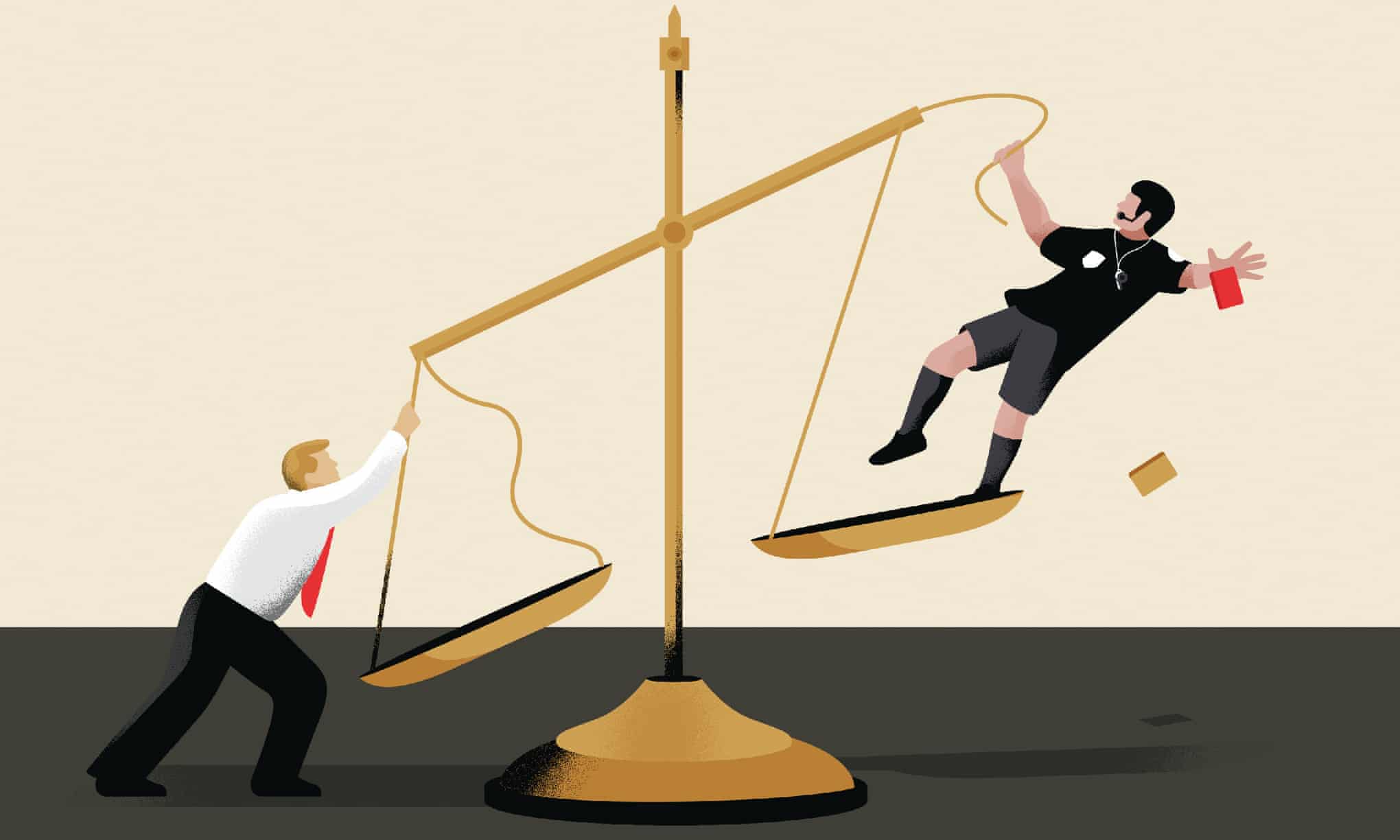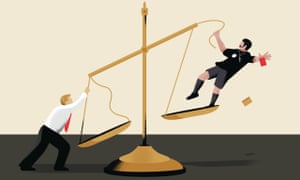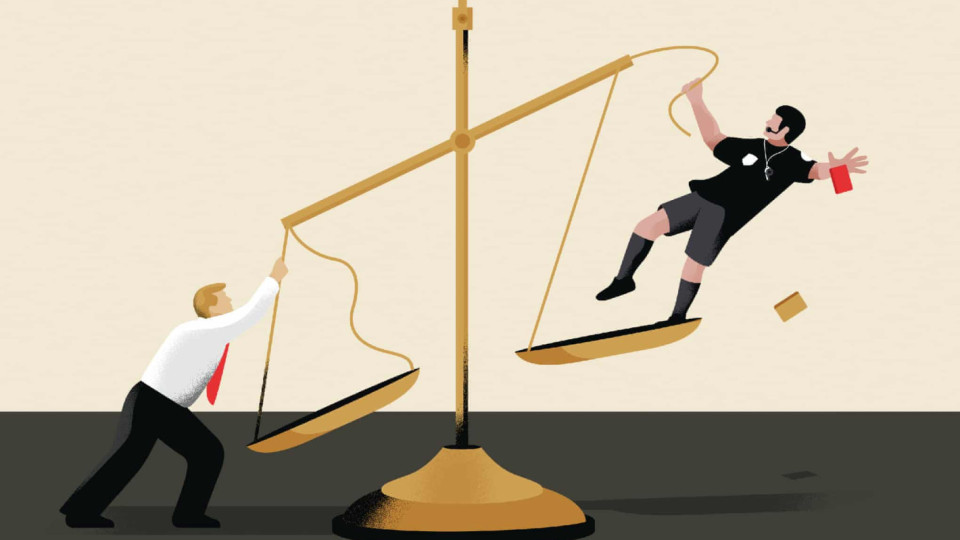

Aplea to those of you who are not fans of sport. There might be a little bit of football and, to my own surprise, even some basketball in what follows. But I promise it’s not the whole story. My concern here is with something that goes far beyond sport, that points to a trend spreading into every aspect of our lives and across much of the globe. But, I confess, it begins at the Emirates stadium watching Arsenal.
I came late to the beautiful game, drawn to it by the enthusiasm of my young sons. One thing that happened in the stands came as a surprise to me. Of course, I knew emotions would run high, with fury expressed in a stream of four-letter abuse. But the target was unexpected. To this day, the greatest rage of those who sit around me is never directed at Arsenal’s opponents. Sure, there’s anger at Arsenal’s manager for his decisions, or the players for their mistakes. But the most frequent object of my neighbours’ ire is the referee or his fellow officials. They are slammed for being either blind, a “fatboy”, or driven by what’s assumed to be an unbending loathing of Arsenal Football Club.
I’d not given this much thought till I listened to a new podcast by Michael Lewis, author of The Big Short and Moneyball. The first episode of Against the Rules focuses on the state of refereeing in the NBA, America’s premier basketball league – and how it’s getting better and better. The NBA has built a state-of-the-art “replay center” in Secaucus, New Jersey, complete with 110 screens connected by super-fast cables, where a disputed incident on the court can be viewed from any angle, slowed down to a 60th of a second. Basketball referees have become fitter too: no more “fatboys”. They are more diverse, no longer just a bunch of white men. They’ve had training and are steadily eliminating the various biases revealed by meticulous data analysis: the bias towards the home team, towards the losing team, towards the team that, in ethnic or racial terms, most resembles the officials themselves. Basketball refereeing has become fairer and more accurate than it’s ever been.
And yet, referees have never been more hated. No longer merely booed inside the arena, thanks to social media they’re now subject to an electronic crowd where the fury is amplified. Death threats are frequent and it’s common for the man with the whistle to be accompanied to and from a game by bodyguards.
Fascinatingly, Lewis shows how the most frequent challenges to the refs’ authority on the court come from the game’s biggest stars: those so rich and powerful they believe the rules shouldn’t apply to them. And of course that sense of entitlement is not confined to sport.
When California researchers lurked in the bushes watching to see which cars stopped at a pedestrian crossing, they discovered that none of the “poor cars” – cheap, old vehicles – blazed through, but 45% of the drivers of the most expensive cars – brand new Mercedes and the like – did exactly that. The rules didn’t apply to them. Whether it’s basketball or the road, those with wealth or power see the rules, or the referees who enforce them, as an inconvenience, a restraint to be pushed out of the way.

Area by area, Lewis’s podcast explores the way America’s umpires are under assault, whether it’s the quiet abolition of the role of public editor on the country’s biggest newspapers (equivalent to the Guardian’s readers’ editor, who you’ll be glad to know is still in place); the emasculation of the US regulator in personal finance, so there’s now barely anyone to stand up to, say, the payday loan companies which can make billions charging the poor interest rates that leap from 30% to 200%; or the pressure on court judges who, like referees, are now subject to instant online mobs denouncing their rulings. Witness James Robart, the Seattle judge who halted Donald Trump’s “Muslim travel ban”, thereby prompting a million hostile emails, including death threats deemed so credible that he had to be given 24-hour protection.
This phenomenon is hardly confined to the US. Journalists, for example, perform a referee function, blowing the whistle when the powerful break the rules, and Trump is merely the loudest of several world leaders who attack the press as pedlars of “fake news”. Turkey’s Recep Tayyip Erdoğan, Brazil’s Jair Bolsonaro and Israel’s newly re-elected prime minister, Benjamin Netanyahu, have all used that same phrase.
Scholars too serve as arbiters, with academics often relied upon to give a definitive verdict on what’s true or false. They too are getting barracked from the terraces, written off as biased members of the elite, even when drawing scientific conclusions based on evidence. Note the anti-vaxxer movement’s attitude to vaccine safety (a stance that has now led to a measles outbreak in Brooklyn, New York). Britain is scarcely immune to such thinking. It was here, after all, where a cabinet minister, one Michael Gove, declared that “people in this country have had enough of experts”.
But it is perhaps the assault on judges that is most alarming. Britain had a glimpse of it when the Daily Mail denounced in Stalinist language those members of the supreme court who had insisted parliament has a say on Brexit as “enemies of the people”. But note the way Trump’s serial condemnation of judges who rule against him, or even dare hear cases against him, has spread. One explanation for Netanyahu’s success this week was his adherence to the Trump playbook, brushing aside the corruption indictments that hang over him as a “witch-hunt”, pursued not by an impartial legal system but by a legal establishment in cahoots with his political enemies – the same formulation deployed by Trump against the Mueller inquiry.
This isn’t a matter only of rhetoric. The fear now is that Netanyahu’s new government will move to curb the judiciary, which has often provided a vital check on the Israeli executive, not least by putting the appointment of judges in the hands of politicians. That would echo what is already under way in Poland or Hungary, where an independent judiciary along with a free press has been cast as an unnecessary burden, a barrier in the way of the “will of the people”.
Such developments are usually reported as outliers, as deviations from the global norm. But a conversation I had in Israel this week shook me from that complacency. Netanyahu has forged strong relations not only with Trump, Bolsonaro and Hungary’s Viktor Orbán, but also with Vladimir Putin, Narendra Modi and Xi Jinping, as well as various authoritarian regimes in Africa. Viewed like this, it is the liberal democratic nations of what my interlocutor pointedly narrowed down to “north-western Europe” that are the isolated exceptions. Increasingly the norm across the globe is either no democracy or the “illiberal democracy” advocated by Orbán, in which elections are combined with a disregard for those institutions that once guaranteed the rule of law. In these illiberal democracies, the game is still played – but with a much weaker referee.
Perhaps this war on the refs is simply one more aspect of the current populist wave that pits an imagined, noble people against an elite determined to deny them their will. But it is a disturbing one. Unloved they might be, but referees’ only job is to make things fair, to keep the playing-field level, so that the strong cannot simply out-muscle the weak. We’ve always needed them. But we really need them now.
The Guardian











Leave a comment